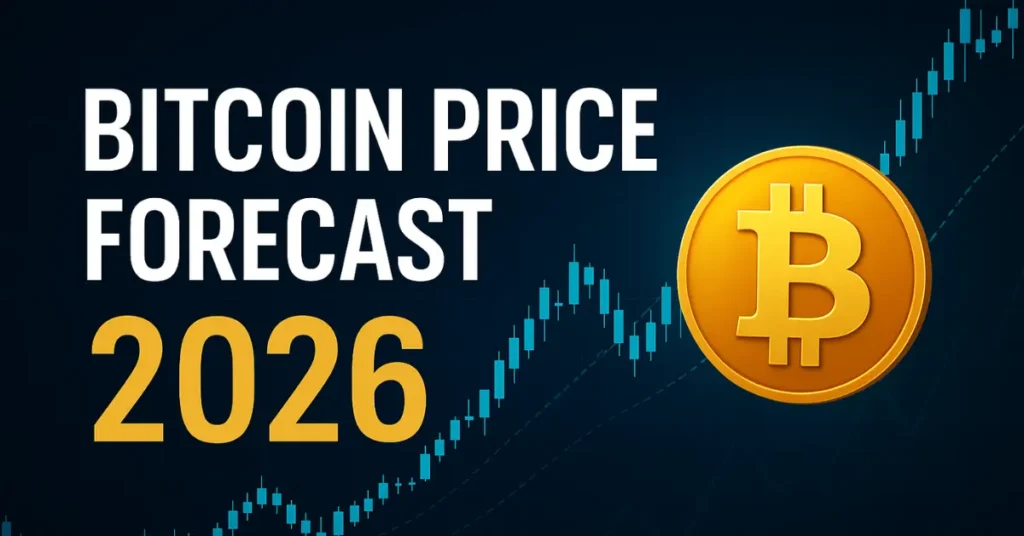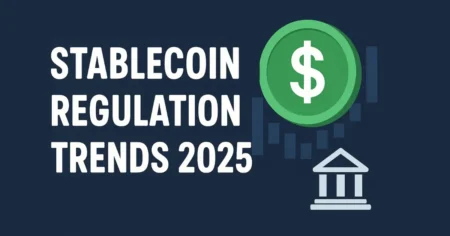Introduction
Bitcoin has traveled an incredible journey from being an experimental form of digital money in 2009 to becoming a major player in the global financial system. In the United States, it is no longer just something tech enthusiasts talk about on online forums — it’s an asset class discussed in boardrooms, financial news, and even in Congress.
But for investors, the big question is: Where could Bitcoin’s price be in 2026?
Forecasting Bitcoin is part art, part science. We can study past price trends, analyze the economic environment, and track adoption rates, but there will always be an element of unpredictability. Still, creating a price forecast is valuable because it provides a framework for decision-making, rather than just a random guess.
By the time we reach 2026, several key events are expected to unfold: the next Bitcoin halving, new regulatory rules in the U.S., and potentially, massive growth in institutional investment. This makes 2026 a particularly interesting year to examine.
In this guide, we’ll start with the basics — perfect for beginners who want to understand Bitcoin and its price drivers. Then, as we move through the article, we’ll step up the complexity, adding technical insights and advanced strategies for serious investors.
Why Bitcoin Price Forecasts Matter for the U.S. Investors
Bitcoin price forecasts aren’t just for traders who watch charts all day. They are useful tools for everyday investors, long-term planners, and even businesses.
For American investors, understanding where Bitcoin might be in 2026 helps with:
- Financial Planning – Whether you’re saving for retirement, buying a home, or funding a business, knowing potential price ranges can help you decide when and how to invest.
- Portfolio Allocation – Bitcoin behaves differently from stocks and bonds. A price forecast can guide how much of it to include in your investment mix.
- Risk Management – Price predictions prepare you for potential downturns so you can avoid panic-selling.
- Tax Strategy – In the U.S., Bitcoin is taxed as property. Understanding when to sell can help you manage capital gains taxes more effectively.
For someone just starting, the takeaway is simple: price forecasts help you make informed choices instead of relying on luck or hype.
The Key Drivers Behind Bitcoin’s Price in 2026
Institutional Adoption
When large institutions — like banks, investment funds, and corporations — buy Bitcoin, they tend to hold it for long periods. This removes supply from the market and puts upward pressure on prices. By 2026, the level of institutional involvement could be far higher than it is today.
U.S. Regulation
The legal environment for Bitcoin in America can either speed up or slow down its growth. Supportive regulation could open the door for more mainstream products like retirement account options and payment integrations. Harsh rules could limit growth.
The Bitcoin Halving
Every four years, the number of new Bitcoins produced is cut in half. This “halving” event reduces supply, and historically, the months after a halving have seen price increases. The next halving is in 2024, so by 2026, its effects will still be influencing the market.
Macroeconomic Factors
Things like inflation, interest rates, and the strength of the U.S. dollar will also play a role. In times of economic uncertainty or high inflation, Bitcoin often attracts more interest as an alternative store of value.
Network Growth
As more people use and accept Bitcoin for payments, its utility grows — and so does demand. By 2026, faster transactions and broader adoption could make Bitcoin more integrated into everyday American life.
Possible Scenarios for 2026
Bullish Scenario
If institutional buying continues to grow, regulation is clear and supportive, and the U.S. economy remains stable or slightly inflationary, Bitcoin could see explosive growth. In this case, 2026 might mark Bitcoin’s first sustained period above six figures.
Base Case Scenario
A more balanced outcome would see Bitcoin growing steadily but without huge spikes. It would still be widely adopted and recognized, but price growth would be gradual. This scenario might involve healthy but not extreme market optimism.
Bearish Scenario
In a less favorable environment — such as a severe recession, aggressive regulation, or declining adoption — Bitcoin could remain range-bound or even fall. While this would likely be temporary, it’s a possibility investors should be ready for.
Understanding Bitcoin’s Market Cycles
Bitcoin doesn’t move randomly — it tends to follow repeating patterns known as market cycles. These cycles are shaped by a mix of investor psychology, supply dynamics, and macroeconomic events. Understanding them is key to making a smart 2026 forecast.
The Four Stages of a Bitcoin Cycle
- Accumulation Phase – Prices are low, interest is minimal, and smart money starts buying quietly.
- Uptrend / Bull Run – Prices start rising as awareness spreads. More investors join in, pushing prices even higher.
- Distribution Phase – Prices peak, early buyers start selling, and volatility increases.
- Downtrend / Bear Market – Prices fall sharply as excitement fades, and weaker hands exit the market.
These phases don’t have fixed timelines, but historically, Bitcoin’s most dramatic bull runs have happened in the 12–18 months after a halving. Since the next halving is in 2024, we could see strong upward pressure in late 2025 and into 2026.
How 2026 Could Compare to Past Bull Runs
To get a feel for where 2026 might land, it’s useful to look at Bitcoin’s past major rallies. In earlier cycles, prices rose several hundred percent after a halving, only to crash by 70–80% afterward.
However, there’s one big difference heading into 2026: institutional stability. In past cycles, most demand came from retail investors, which meant emotional swings and panic selling drove extreme volatility. By 2026, more of the market may be made up of institutions that hold for the long term, which could soften the size of future crashes.
That said, don’t mistake “more stability” for “no volatility.” Bitcoin can still drop 30% in a matter of weeks, even in a strong bull market.
Potential Risks That Could Limit 2026 Gains
Regulatory Shocks
If U.S. lawmakers or regulators impose unexpected restrictions — for example, limits on Bitcoin trading or taxes on transactions — it could slow down adoption.
Technological Issues
While Bitcoin’s code is secure, any major bug, network attack, or large-scale mining disruption could impact confidence.
Global Economic Downturn
A severe recession could lead investors to pull back from riskier assets, including Bitcoin, even if its long-term prospects remain strong.
Competing Innovations
If another blockchain or digital currency offers faster, cheaper, and more scalable solutions, it could pull demand away from Bitcoin.
Why Thinking in Price Ranges Beats Chasing a Single Number
One of the biggest mistakes new Bitcoin investors make is obsessing over one target price. In reality, smart forecasting works with ranges.
For example, instead of saying “Bitcoin will be $150,000 in 2026,” a better approach might be:
- Bullish range: High adoption and strong macro tailwinds could push it above $200,000.
- Base range: Stable growth lands it between $125,000 and $145,000.
- Bearish range: Unfavorable conditions keep it in the $80,000 to $100,000 zone.
Working in ranges gives you flexibility and prevents overconfidence.
Advanced Forecasting Models for Bitcoin in 2026
Forecasting Bitcoin’s price isn’t about guessing; it’s about using data, history, and market behavior to create informed projections. In the professional world, analysts often use a combination of on-chain metrics, technical analysis, and macroeconomic modeling to develop predictions.
On-Chain Analysis
On-chain data looks directly at Bitcoin’s blockchain to measure investor behavior.
Key metrics for 2026 forecasting include:
- HODL Waves – Shows how long investors have been holding their coins. High long-term holding rates usually signal less selling pressure.
- Realized Cap – Calculates the total market value based on the price when each coin last moved, offering a more accurate reflection of active value.
- Exchange Reserves – Measures how much Bitcoin is sitting on exchanges. Lower reserves often indicate reduced selling pressure.
Stock-to-Flow (S2F) Model
This model compares Bitcoin’s scarcity (stock) to its annual production (flow). After each halving, Bitcoin’s S2F ratio increases, historically leading to higher prices. Based on S2F, some projections put Bitcoin above $180,000 by 2026 — though critics argue this model is too simplistic.
Technical Chart Patterns
Professional traders look at long-term moving averages (like the 200-day MA) and multi-year trendlines to spot breakout points. If Bitcoin stays above certain “support zones” in the mid-$80,000 range post-halving, the odds for a six-figure price by 2026 improve significantly.
The U.S. Macroeconomic Influence
Bitcoin’s price in 2026 will not exist in a vacuum — it will be deeply affected by the state of the U.S. economy.
Interest Rates
If the Federal Reserve keeps rates high to fight inflation, it could limit speculative buying. On the other hand, rate cuts tend to inject liquidity into markets, boosting assets like Bitcoin.
Inflation Trends
If inflation remains persistent in the U.S., more investors might turn to Bitcoin as a hedge, similar to how gold has been used for decades.
Dollar Strength
A weakening U.S. dollar could make Bitcoin more attractive both domestically and internationally. Conversely, a stronger dollar might slow demand.
Building a 2026 Bitcoin Strategy
For advanced investors, a price forecast is just the starting point. The real goal is to turn that forecast into a plan.
Dollar-Cost Averaging (DCA)
Instead of trying to time the perfect entry, invest a set amount regularly. This smooths out volatility and removes emotional decision-making.
Tiered Selling Strategy
Rather than selling all at one price target, plan to sell portions of your holdings at multiple levels (20% at $120K, another 20% at $150K). This helps lock in gains while keeping exposure.
Tax Optimization
In the U.S., holding Bitcoin for over a year qualifies for long-term capital gains tax, which is lower than short-term rates. Structuring your sales around this can save significant money.
My Balanced Bitcoin Price Outlook for 2026
After considering historical patterns, on-chain data, macroeconomic forces, and adoption trends, my balanced projection for Bitcoin in 2026 is:
- Bullish Case – Bitcoin reaches between $200,000 and $250,000 if institutional adoption accelerates, U.S. regulations are supportive, and inflation remains moderate to high.
- Base Case – Bitcoin lands in the $125,000 to $160,000 range if growth is steady but without extraordinary catalysts.
- Bearish Case – Bitcoin stays between $80,000 and $100,000 if regulatory or macro headwinds limit investor confidence.
While it’s tempting to focus on the bullish scenario, I recommend that U.S. investors plan for the base case, remain prepared for downturns, and treat the bullish case as upside potential — not a guarantee.
Risk-Adjusted Positioning for 2026
For serious investors, the goal is not just to maximize returns but to manage risk effectively. Here are risk-adjusted tactics for 2026:
- Core-Satellite Approach – Keep a “core” long-term holding you don’t touch, and a smaller “satellite” portion you trade around key price levels.
- Portfolio Diversification – Even if you’re bullish on Bitcoin, it should remain part of a diversified portfolio with assets like stocks, bonds, and real estate.
- Liquidity Management – Keep some cash reserves ready to buy during dips; 2026 will likely still have high volatility.
Conclusion
Bitcoin’s 2026 price will be shaped by a powerful mix of supply dynamics, adoption trends, macroeconomic factors, and investor psychology. The halving in 2024 sets the stage for potential growth, but success will also depend heavily on U.S. regulation and global economic health.
For American investors, the smartest approach is to think in price ranges, use disciplined buying and selling strategies, and treat Bitcoin as part of a broader financial plan. The road to 2026 may not be smooth, but the opportunities are significant for those who stay informed, patient, and strategic.
FAQs
Q1: Could Bitcoin hit $250,000 by 2026?
Yes, in a strong bullish scenario with high adoption and supportive macro trends, but it’s not guaranteed.
Q2: Will the 2024 halving still affect prices in 2026?
Likely yes, historically, halvings have boosted prices for 12–18 months afterward.
Q3: Is Bitcoin safe from U.S. regulation?
No asset is completely safe from regulation. Rules could help or hinder growth depending on how they’re implemented.
Q4: Should I buy Bitcoin all at once for 2026?
Dollar-cost averaging is generally safer than lump-sum buying due to volatility.
Q5: Could Bitcoin fall below $80,000 in 2026?
It’s possible in a bearish scenario, especially if macro or regulatory conditions worsen.
Also, read
- What is a crypto wallet, and how does it work? – Coinsify
- 10 Crypto Terms Every Beginner Must Know: Coinsify
- What is blockchain technology? Complete Guide – Coinsify
- How to Buy Crypto Safely in 2025: Complete Guide – Coinsify
- Bitcoin vs Ethereum: Key Differences Explained: Complete Guide
- Ultimate Blockchain Glossary: Learn Blockchain Terms Easily
- How to Buy Bitcoin Safely (Complete Beginner’s Guide)
- Top 10 Crypto Wallets for Beginners (2025 Edition)
- What is cryptocurrency? A Beginner-Friendly Guide (2025)






